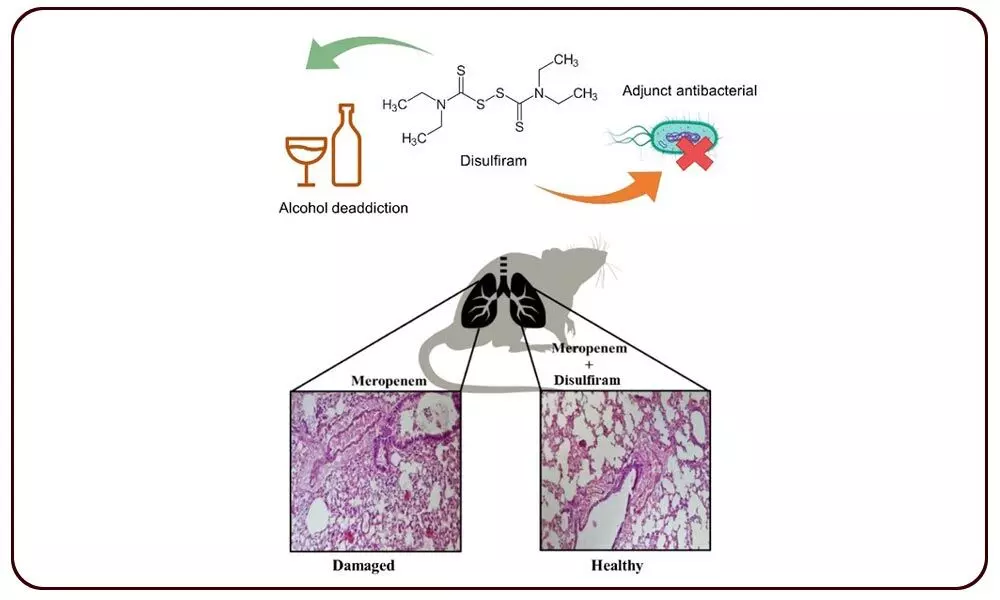Researchers from IIT Roorkee discover a molecule that targets Carbapenem resistance in bacterial pathogens

Researchers from IIT Roorkee discover a molecule that targets Carbapenem resistance in bacterial pathogens
The study has been published by Oxford University Press in the Journal of Antimicrobial Chemotherapy.
Researchers from the Indian Institute of Technology Roorkee (IIT Roorkee)have deciphered a novel mechanism of Disulfiram in treating blood infections and pneumonia caused by the Metallo-beta-lactamase producing Acinetobacter baumannii, a nosocomialtop priority pathogen.
The research team led by Prof. Ranjana Pathania discovered that the drug Disulfiram can prevent the normal functioning of Metallo-β-lactamase, an enzyme that neutralizes last resort carbapenem antibiotics. Disulfiram thus improves the antibacterial activity of Carbapenem class of antibiotics against carbapenem-resistant Acinetobacter baumannii. The study by Vineet Dubey, Kuldip Devnath, Mangal Singh, Prof. Ranjana Pathania and others working in the Molecular Bacteriology and Chemical genetics laboratory in the Department of Biosciences and Bioengineering, IIT Roorkee, has been published by Oxford University Press in the Journal of Antimicrobial Chemotherapy.
Acinetobacter baumannii is a serious problem in the hospitals worldwide. This is because it is one of the primary causes of infection in patients who rely on hospital ventilators and invasive devices like urinary catheters. 63% of infections are caused by the multidrug-resistant strains of this bacterium, which is of primary concern due to its increased resistance to antibiotics. Since these pathogens have Carbapenem degrading enzymes, the World Health Organization (WHO) has designated this pathogen as a critical priority for research and development of new treatment drugs in 2017. The researchers have used various methods of testing the antibiotic sensitivity of the bacteriathat demonstrate that Disulfiram can render Meropenem, a commonly used antibiotic for bacterial infections, more effective against New Delhi Metallo-β-lactamase (NDM) and Integral Membrane Protein (IMP) producing Carbapenem-resistant Acinetobacter baumannii. Disulfiram-Carbapenem combination studies could pave the way for future clinical treatments.
Prof. Ajit K Chaturvedi, Director, IIT Roorkee, said ,"Antibiotic resistant microbial infection is a major public health problem worldwide. This research is a ray of hope that has opened avenues for the treatment of infections of the blood, urinary tract, lungs, wounds and other body sites caused by such pathogens."
Principal Investigator, Prof. Ranjana Pathania, Department of Biosciences and Bioengineering, IIT Roorkee, highlighted, "Disulfiram is an FDA approved drug prescribed as a deterrent to aid patients in developing abstinence in cases of chronic alcoholism. The team compared Carbapenem monotherapy with Carbapenem therapy in combination with Disulfiram as a Metallo-β-lactamase inhibitor, where the combination group displayed improved lowering of bacterial burden in mice tissues. In time–kill analysis, which measures the change in bacterial population in a controlled environment, Meropenem and Disulfiram exhibited synergy against NDM and IMP producing Carbapenem resistant Acinetobactbaumannii (CRAb) isolates. The combination performed better in the clearance of bacterial load from the liver and spleen of mice infected with IMP-expressing CRAb. In the pneumonia model, the combination significantly decreased the bacterial burden of NDM producers compared with monotherapy."
About IIT Roorkee (https://www.iitr.ac.in/)
IIT Roorkee is an institute of national importance imparting higher education in engineering, sciences, management, architecture and planning, and humanities and socialsciences. Since its establishment in 1847, the Institute has played a vital role in providing technical human resources and know-how to the country.










